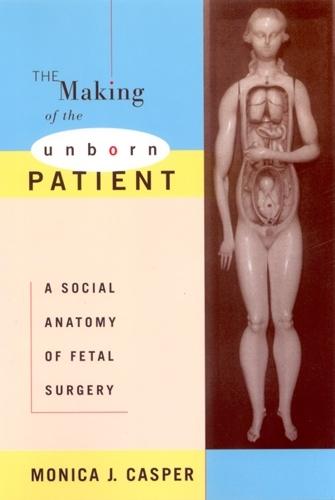Overview
It is now possible for physicians to recognize that a pregnant woman's foetus is facing life-threatening problems, perform surgery on the foetus, and if it survives, return it to the woman's uterus to finish gestation. Although foetal surgery has existed in various forms for three decades, it is only just beginning to capture the public's imagination. These still largely experimental procedures raise all types of medical, political and ethical questions. Who is the patient? What are the technical difficulties involved in foetal surgery? How do reproductive politics seep into the operating room, and how do medical definitions and meanings flow out of medicine and into other social spheres? How are ethical issues defined in this practice and who defines them? Is foetal surgery the kind of medicine we want? What is involved in reframing foetal surgery as a women's health issue, rather than simply a paediatric concern? In this ethnographic study of the social, cultural and historical aspects of foetal surgery, Monica Casper addresses these questions. ""The Making of the Unborn Patient"" examines two important and connected events of the second half of the 20th century: the emergence of foetal surgery as a new medical specialty and the debut of the unborn patient. Drawing on a wide range of sources, Casper shows how biomedical work has intersected with reproductive politics for three decades to generate new cultural meanings of foetuses, women and medicine itself. Since its inception, foetal surgery has been controversial both inside and outside of medicine precisely because it transgresses a number of boundaries, challenging our most cherished assumptions about pregnancy, maternal sacrifice, foetal life and death, and the limits of technology. Like many other medical innovations, especially those at the beginnings and ends of human life, foetal surgery is proceeding rapidly but without careful reflection about what it means and without public debate about its consequences. Foetal surgery is risky, expensive and fraught with peril for both women and their foetuses. This book offers a critical social and cultural analysis of this nascent yet significant innovation in biomedicine. Analyzing original data, Casper explores early foetal surgery efforts and the emergence of the unborn patient in the 1960s. She examines several related practices, including foetal physiology, diagnostic technologies, animal experimentation, and foetal wound healing research, and the ways in which they have shaped foetal surgery. She presents ethnographic data collected at one of the premier US foetal treatment facilities, offering a behind-the-scenes look at the various kinds of work involved in operating on human foetuses. She also examines the many ethical dilemmas involved in research on human subjects in experimental foetal surgery. Perhaps most significantly, the book draws attention to the many ways in which foetal surgery affects women's health.
Full Product Details
Author: Monica J. Casper
Publisher: Rutgers University Press
Imprint: Rutgers University Press
Dimensions:
Width: 15.20cm
, Height: 2.00cm
, Length: 22.90cm
Weight: 0.454kg
ISBN: 9780813525167
ISBN 10: 0813525160
Pages: 288
Publication Date: 01 June 1998
Audience:
College/higher education
,
Professional and scholarly
,
Undergraduate
,
Postgraduate, Research & Scholarly
Format: Paperback
Publisher's Status: Active
Availability: Out of print, replaced by POD

We will order this item for you from a manufatured on demand supplier.
Reviews
"Fascinating! Casper's work on fetal surgery is cutting-edge scholarship. The author uses the methods of qualitative, grounded sociology in the service of science studies and women's studies to produce a compelling, well-researched analysis of the history and social practices through which fetal surgery is currently emerging. In doing so, she provides substantial food for political thought.--Rayna Rapp ""professor of anthropology, New School for Social Research and co-editor of Conce"" In a multi-site analysis that takes the reader from place to place (from the laboratories, to hospitals, to media discourses, etc.) where the story of fetal surgery unfolds, the book's chapters lay out a well-ordered and well-documented series of arguments....The central argument of the book is that the making of fetal surgery has, simultaneously, built on and contributed to the making of the fetus, as both patient and person. Furthermore, fetal patient-and personhood has been based on the assumption of a conflict of interests between mother and fetus. As Casper convincingly argues, this assumption is a cultural artifact, not a natural fact...The book should be of major interest to activists in the women's health movement.-- ""Medical Anthropology Quarterly"" An exemplary study of an astonishing and controversial medical specialty, The Making of the Unborn Patient is, at the same time, a lucid commentary on health-care politics, women's rights, and the very nature of personhood. By skillfully interweaving analyses from sociology, science studies, and feminist studies, Casper shows how women's bodies and choices may be ""erased"" by medical heroics. From the spectacle of the operating theater to the larger social dramas of our times, this is a captivating narrative grounded in careful ethnographic research, resistant to easy answers, and infused with moral concerns.--Steven Epstein ""author of Impure Science: AIDS, Activism, and the Politics of Knowledge """
Author Information
MONICA J. CASPER is an assistant professor of sociology at the University of California, Santa Cruz. She is also affiliated with the Stanford University Center for Biomedical Ethics. The work upon which this book is based won the 1996 dissertation award from the American Sociological Association's Medical Sociology Section.




